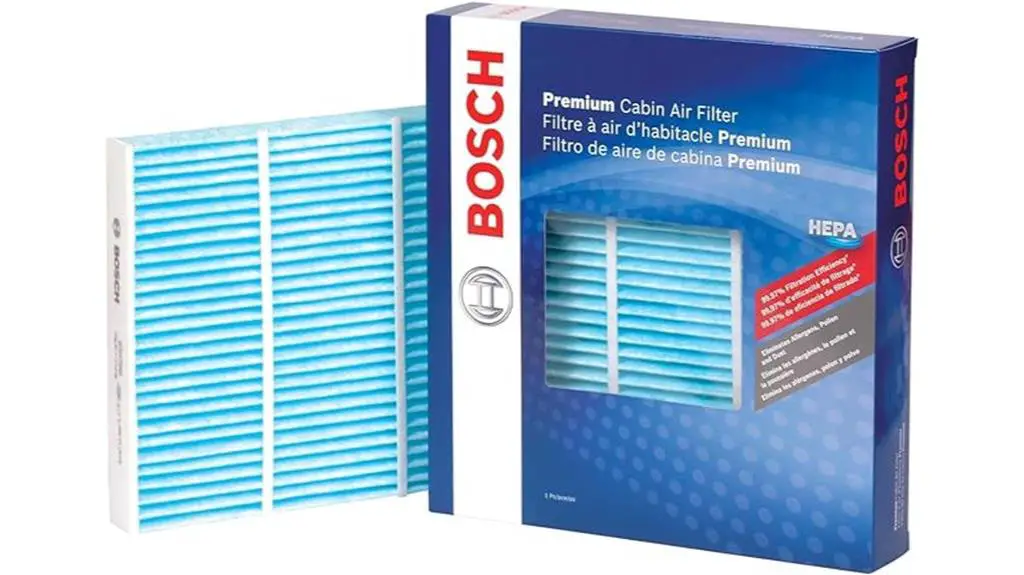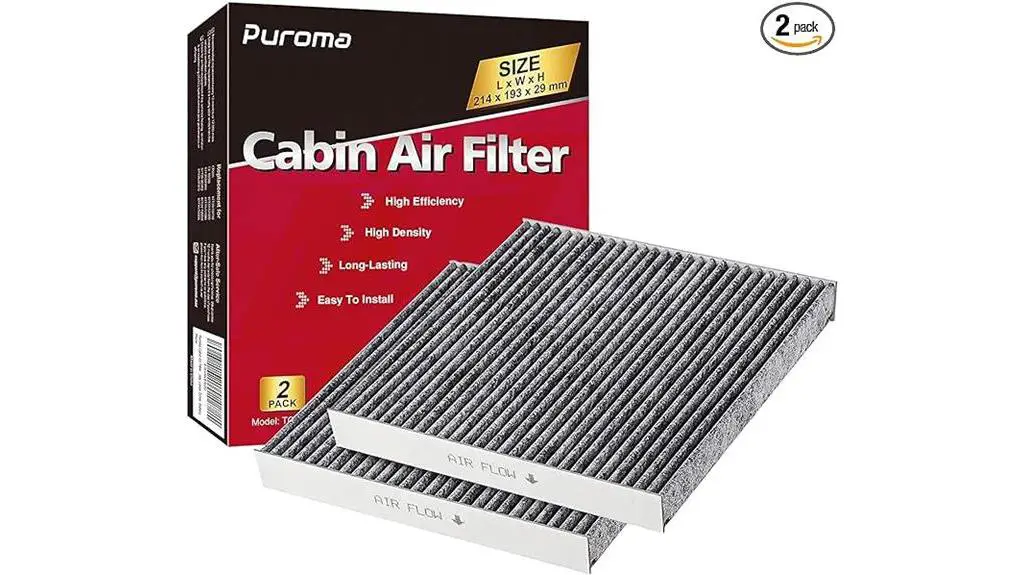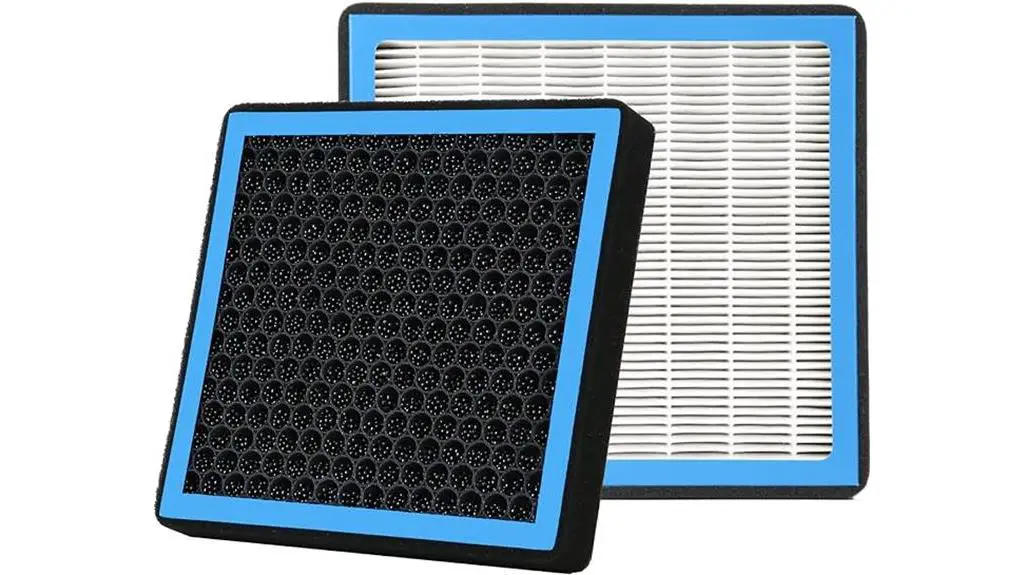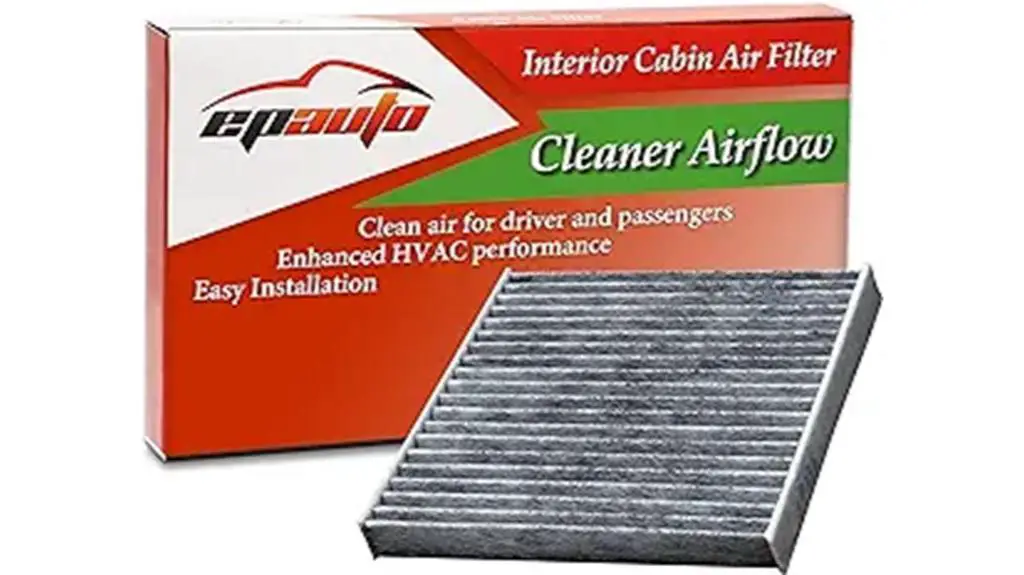You might think that replacing your cabin air filter isn't a priority, but neglecting it can lead to poor air quality and discomfort during your drives. Choosing the right filter can markedly impact your Toyota Tundra's cabin environment, providing cleaner air and reducing allergens and odors. With so many options available, how do you know which filters truly enhance your driving experience? Let's explore the seven best cabin air filters that can make a noticeable difference in your vehicle's comfort and performance.
Things to Note
- The Bosch HEPA Cabin Air Filter offers a high filtration efficiency of 99.97%, ensuring superior air quality for your Tundra.
- K&N Cabin Air Filter enhances airflow and is reusable, reducing the need for frequent replacements while improving heating and cooling efficiency.
- Puroma Cabin Air Filter utilizes activated carbon technology to effectively capture odors, providing a fresher cabin environment.
- FRAM Fresh Breeze Cabin Air Filter combines baking soda and carbon for effective odor elimination and captures pollen and smoke irritants.
BOSCH HEPA Cabin Air Filter for Select Lexus, Subaru, and Toyota Models

The Bosch 6055C HEPA Cabin Air Filter is an excellent choice for Toyota Tundra owners seeking superior air quality, boasting a filtration efficiency of 99.97% at 0.3 microns to keep the cabin environment clean and fresh.
This filter meets HEPA standards based on ISO 29463-3:2011, ensuring effective air purification. Its unique design features a melt-blown electrostatic layer and dense media, enhancing its trapping capabilities.
Additionally, a static cotton layer increases filtration capacity, while structural ribs maintain filter integrity and stability.
Weighing only 2.08 ounces and measuring 9.25 x 9.65 x 1.77 inches, it's lightweight yet powerful.
Compatible with various Lexus, Subaru, and Toyota models, the Bosch filter provides an ideal solution for improved cabin air quality.
Best For: Toyota Tundra owners looking for a high-quality cabin air filter to enhance air purity and comfort.
Pros:
- High filtration efficiency of 99.97% at 0.3 microns, ensuring clean air.
- User-friendly installation with no tools required, making replacement easy.
Cons:
- Increased filter density may require adjustments to fan settings for optimal airflow.
- Compatibility verification is necessary due to varying vehicle trim levels.
Cabin Air Filter Replacement for Toyota, Lexus, Scion Vehicles

For Toyota, Lexus, and Scion owners seeking a reliable solution, the Cabin Air Filter Replacement boasts three-layer filtration technology that effectively captures 99% of airborne contaminants.
This filter not only enhances air quality by filtering dust, soot, and pollen but also features premium activated carbon to absorb unpleasant odors, ensuring a fresh environment for all passengers.
Installation is simple, taking just five minutes without the need for tools, making it an accessible upgrade.
Compatible with various models, including the Tundra and RAV4, it's recommended to replace the filter every 12 months or 12,000 miles.
With a customer rating of 4.8 stars, users praise its effectiveness and cost-efficiency compared to dealership options, making it a top choice.
Best For: Toyota, Lexus, and Scion owners looking for an easy-to-install cabin air filter that improves air quality and eliminates odors.
Pros:
- Easy installation in just five minutes with no tools required.
- High efficiency in filtering 99% of dust, pollen, and airborne contaminants.
Cons:
- Recommended replacement every 12 months or 12,000 miles may require frequent purchases.
- Compatibility limitations may not cover all Toyota, Lexus, and Scion models.
K&N Cabin Air Filter for Lexus and Toyota Vehicles

Engineered for peak performance, the K&N Cabin Air Filter enhances airflow in 2022-2023 Toyota Tundra models, ensuring a fresher and more efficient driving experience.
This high-performance, washable filter is designed specifically for various Lexus and Toyota vehicles, including the 2018-2023 Lexus LS500/LS500H and 2023 Toyota Sequoia.
Its increased airflow considerably improves heating and cooling efficiency while helping to control odors, preventing musty smells inside the vehicle.
Installation is a breeze, taking just five minutes without any tools required.
Weighing 13.3 ounces and measuring 9.87 x 1.94 x 11.38 inches, this filter is built to last throughout the vehicle's lifespan.
Customers consistently rate it highly, with an impressive 4.8 out of 5 stars.
Best For: Those seeking a high-performance, washable cabin air filter for improved air quality and efficiency in select Lexus and Toyota vehicles.
Pros:
- Increased airflow enhances heating and cooling efficiency, leading to a better driving experience.
- Washable and reusable, designed to last the lifespan of the vehicle, reducing the need for frequent replacements.
Cons:
- Limited compatibility, specifically designed for select Lexus and Toyota models only.
- Initial cost may be higher compared to standard disposable filters.
Puroma Cabin Air Filter with Activated Carbon (Replacement for Various Models)

Designed with activated carbon, the Puroma Cabin Air Filter effectively captures odors and contaminants, making it an excellent choice for Toyota Tundra owners seeking clean, fresh cabin air.
This filter is compatible with various Toyota models and other brands, ensuring broad applicability. It features a non-woven layer that prevents dust and particles from entering the cabin, enhancing the vehicle's HVAC performance.
Installation is straightforward, taking about 10 minutes, aided by an easy-to-read airflow arrow. Users appreciate the perfect fit and report significant reductions in dust and mustiness.
With a customer rating of 4.7 out of 5 stars from nearly 7,000 reviews, the Puroma filter stands out as a reliable option for improving air quality in the vehicle.
Best For: Those seeking a reliable cabin air filter to improve air quality in Toyota and various other vehicle models.
Pros:
- Effective odor elimination with activated carbon technology.
- Easy installation in approximately 10 minutes, featuring clear airflow guidance.
Cons:
- Replacement frequency may increase in polluted areas, requiring more maintenance.
- Limited compatibility outside of specified Toyota and other brand models.
FRAM Fresh Breeze Cabin Air Filter Replacement for Toyota Vehicles

The FRAM Fresh Breeze Cabin Air Filter CF10285 is an excellent choice for Toyota Tundra owners seeking superior air quality, thanks to its unique combination of Arm & Hammer baking soda and carbon that effectively eliminates odors and filters out contaminants.
Measuring 8.47 x 7.64 x 1.14 inches and weighing just 3.2 ounces, it's designed for a wide range of Toyota models, including the Tundra from 2007 to 2021.
Installation is straightforward, taking about 15 minutes without any tools.
This filter boasts a filtration effectiveness of 98%, capturing irritants like pollen and smoke.
Customers praise its odor-removing capabilities and report significant improvements in air quality, making it a cost-effective choice compared to dealer alternatives.
Best For: Toyota Tundra owners looking for an effective and easy-to-install cabin air filter that enhances air quality and eliminates odors.
Pros:
- High filtration effectiveness, capturing 98% of contaminants including pollen and smoke.
- Easy installation process, taking approximately 15 minutes without the need for tools.
Cons:
- Limited compatibility with non-Toyota vehicles, which may restrict options for some buyers.
- Some users may experience a slight initial odor from the filter itself.
CF10285 Cabin Air Filter with Activated Carbon for Toyota Vehicles

For Toyota Tundra owners seeking superior air quality, the CF10285 Cabin Air Filter with activated carbon effectively filters contaminants while enhancing cabin comfort.
This filter is compatible with a wide range of Toyota models from 2010 to 2020, including the 4Runner, Camry, and RAV4, as well as several Lexus and Scion vehicles.
Made from high-grade materials, the CF10285 undergoes rigorous quality control to guarantee peak performance and longevity.
It replaces multiple part numbers, making it a versatile choice for many Toyota and other vehicle owners.
By incorporating this filter, drivers can breathe easier and enjoy a cleaner, fresher cabin environment, ultimately improving their overall driving experience.
Best For: Toyota Tundra owners and those with compatible Toyota, Lexus, and Scion vehicles looking to improve cabin air quality.
Pros:
- High-grade materials ensure durability and long-lasting performance.
- Activated carbon effectively filters out contaminants, enhancing air quality inside the vehicle.
Cons:
- Limited to specific models; may not fit vehicles outside the listed compatible range.
- Installation may require tools or professional assistance for some users.
EPAuto CP285 (CF10285) Premium Cabin Air Filter includes Activated Carbon

Looking for a cabin air filter that enhances air quality for both drivers and passengers?
The EPAuto CP285 (CF10285) Premium Cabin Air Filter with Activated Carbon is an excellent choice for Toyota Tundra owners. This filter is specifically designed to provide clean air by incorporating soda and activated carbon, ensuring a fresh driving experience.
It's recommended to replace it every 12 months or 12,000 miles to maintain peak performance. Compatible with various Toyota Genuine Parts and some Subaru and General Motors models, the EPAuto CP285 is versatile.
With a customer rating of 4.7 out of 5 stars from over 40,000 reviews, it's praised for its ease of installation and improved air quality, making it a top choice among automotive filters.
Best For: Those seeking a high-quality cabin air filter to improve air quality in their vehicles, particularly for Toyota Tundra owners.
Pros:
- Easy installation that allows for quick replacement without professional help.
- Activated carbon technology enhances air purification, reducing odors and pollutants.
Cons:
- Some users report thicker filters that may affect fit in certain models.
- Limited performance in odor removal compared to some premium options.
Factors to Consider When Choosing a Cabin Air Filter for Toyota Tundra
When choosing a cabin air filter for your Toyota Tundra, there are several key factors to keep in mind.
You'll want to evaluate filtration efficiency standards, compatibility with your specific model, and the benefits of activated carbon.
Don't forget to think about how easy it is to install and how often you'll need to maintain it.
Filtration Efficiency Standards
Filtration efficiency standards are vital to evaluate, as they determine how effectively a cabin air filter captures harmful particles and pollutants in your Toyota Tundra. One of the most recognized benchmarks is the HEPA standard, which mandates a minimum efficiency of 99.97% for particles as small as 0.3 microns. When choosing a filter, look for those that meet or exceed these standards.
Consider filters that utilize advanced technologies like activated carbon and multi-layer systems. These can greatly enhance the removal of various pollutants, allergens, and unpleasant odors, ensuring a cleaner and fresher cabin environment. A high-quality cabin air filter should capture a wide range of contaminants, including dust, pollen, and smoke, to promote better air quality inside your vehicle.
Additionally, be mindful of the ISO 29463-3:2011 standard, which outlines performance requirements for HEPA filters. Regularly replacing your cabin air filter—typically every 12 months or 12,000 miles—is essential for maintaining ideal filtration efficiency.
Compatibility With Models
Choosing the right cabin air filter for your Toyota Tundra involves verifying compatibility with your specific model year, as filters can differ considerably from 2007 to 2023. Each model year may have unique specifications, so it's vital to check the part numbers or use fit checkers to confirm compatibility.
When selecting a filter, look for options that meet OEM specifications. This guarantees that the filter will provide the necessary filtration and maintain good air quality inside your vehicle. Many cabin air filters designed for the Tundra also fit other Toyota models, like the Sequoia and Sienna, which can enhance your options considerably.
Keep in mind that some filters can replace multiple OEM part numbers, making it easier to find the right match. Regularly replacing your cabin air filter is essential for peak performance, with recommended intervals typically at 12 months or 12,000 miles.
This practice verifies that you're breathing clean air and enjoying a comfortable ride in your Tundra. Always double-check compatibility before purchasing to avoid any issues down the line.
Activated Carbon Benefits
Activated carbon cabin air filters offer significant benefits, enhancing your Toyota Tundra's interior air quality by absorbing odors and capturing airborne contaminants. These filters are highly effective, absorbing up to 99% of unpleasant smells, which guarantees a fresher driving environment. When you're on the road, whether commuting or on a long trip, you want to breathe clean air, and activated carbon filters help achieve that.
Their porous structure gives these filters a higher adsorption capacity compared to standard options, allowing them to trap a wide range of airborne particles like dust, pollen, soot, and smoke. This means you and your passengers can enjoy cleaner air, especially if you frequently drive in urban areas or near industrial sites.
To maintain peak performance, it's recommended to replace your activated carbon cabin air filter every 12 months or 12,000 miles. However, if you're in a heavily polluted area, consider replacing it more frequently, ideally every 5,000 miles, to guarantee you continue to benefit from its filtering capabilities.
Installation Ease
When upgrading to an activated carbon cabin air filter for your Toyota Tundra, you'll appreciate how easy the installation process can be. Many filters are designed for quick installation, often taking just five to ten minutes without needing any tools. This means you can get back on the road faster and enjoy cleaner air without a trip to the mechanic.
Most filters come with user-friendly designs that include airflow arrows and straightforward step-by-step instructions. Customers frequently report satisfaction with how simple the process is, with many successfully replacing the filter themselves after following the provided guidelines. The filters fit snugly into the existing air filter compartment, ensuring a hassle-free experience.
Additionally, regular replacement intervals of about 12 months or 12,000 miles make it convenient to incorporate filter changes into your routine vehicle maintenance. This ease of installation not only saves you time but also encourages you to keep your cabin air fresh and clean.
Maintenance Frequency
Regularly replacing the cabin air filter in your Toyota Tundra is crucial for maintaining ideal air quality and HVAC performance. It's generally recommended to change the filter every 12 months or 12,000 miles. This frequency helps guarantee that dust, pollen, and other contaminants don't pile up, which can affect your driving comfort.
If you often drive in areas with high pollution or dust, consider replacing the filter more frequently—potentially every 5,000 miles. This proactive approach will help maintain effective filtration, keeping the air inside your vehicle clean and fresh.
Don't forget to monitor the filter's condition periodically. If you notice any reduced airflow or a decline in air quality, it's a good sign that a replacement is due. Neglecting the cabin air filter can lead to inefficient heating and cooling, impacting your overall driving experience.
Odor Control Capabilities
Choosing the right cabin air filter for your Toyota Tundra is vital not only for maintaining air quality but also for effectively controlling odors inside your vehicle. Filters with activated carbon are particularly effective at neutralizing unpleasant smells, ensuring a fresher cabin environment.
When selecting a filter, look for options that can filter out up to 99% of airborne contaminants, including smoke, dust, and pollen, which often contribute to undesirable odors.
Consider filters that utilize multi-layer filtration technology, combining activated carbon with natural deodorizing agents for enhanced odor control. This innovative design greatly improves the overall efficacy of the filter, making your driving experience more enjoyable.
It's also important to replace your cabin air filter regularly—every 12,000 miles or annually—to maintain its effectiveness in odor control and overall air quality. Some filters are specifically engineered to combat musty smells, which can be particularly bothersome during humid weather.
Price Comparison Options
Finding the right cabin air filter for your Toyota Tundra involves considering various price comparison options to ascertain you get the best value for your investment.
Typically, cabin air filters range from about $10 to $50, depending on the brand and filtration technology. If you're looking for premium options, like activated carbon or HEPA filters, you may find prices exceeding $30.
It's essential to note that many filters offer a cost-effective alternative to dealership pricing, which can often be double for similar quality. Since most cabin air filters need replacement every 12,000 miles or annually, you can budget your expenses around this maintenance frequency.
When shopping around, make sure to check online retailers, as they tend to provide competitive pricing and frequent discounts. This makes it easier for you to compare costs across different brands and filter types.
Manufacturer Reputation
When it comes to selecting a cabin air filter for your Toyota Tundra, the manufacturer's reputation plays an essential role in guaranteeing you get a reliable and effective product. Established brands often adhere to stricter manufacturing standards, which can greatly impact the quality of the filter you choose. A reputable manufacturer is likely to utilize advanced filtration technologies, such as multi-layer systems or activated carbon, which can enhance the air quality in your vehicle.
Pay attention to customer reviews and ratings; they offer valuable insight into a manufacturer's reliability and performance. Higher ratings typically indicate greater customer satisfaction, helping you make an informed decision. Additionally, consider manufacturers with a long-standing presence in the automotive industry, as they usually have a proven track record of producing durable and effective cabin air filters.
Lastly, take note of the warranty offerings. A generous warranty suggests that the manufacturer is confident in their product's quality and durability. By prioritizing a reputable manufacturer, you can guarantee that your cabin air filter will provide the performance and longevity you need for a comfortable driving experience.
Frequently Asked Questions
How Often Should I Replace My Toyota Tundra's Cabin Air Filter?
You should replace your Toyota Tundra's cabin air filter every 15,000 to 30,000 miles, depending on your driving conditions.
If you often drive in dusty or polluted environments, consider changing it more frequently.
Regularly checking the filter can help maintain good air quality inside your vehicle, ensuring you and your passengers breathe cleaner air.
Keeping track of this maintenance can enhance your overall driving experience and comfort.
Can a Cabin Air Filter Improve Air Quality Inside My Vehicle?
Did you know that the air inside your vehicle can be up to five times more polluted than the air outside?
A cabin air filter plays an essential role in improving air quality by trapping dust, pollen, and other pollutants.
When you replace it regularly, you guarantee cleaner air circulates in your car, reducing allergens and irritants.
This simple maintenance step makes your drives more enjoyable and healthier for you and your passengers.
Are There Any Signs My Cabin Air Filter Needs Replacement?
You'll notice several signs that your cabin air filter needs replacement.
If you detect reduced airflow from your car's vents or unpleasant odors when the air conditioning is on, it's time to check the filter.
Also, if you see an increase in dust inside your vehicle or experience allergy symptoms while driving, your filter might be clogged.
Regular inspections can help maintain air quality and guarantee a comfortable driving experience.
Is It Necessary to Use OEM Filters for My Tundra?
It's not strictly necessary to use OEM filters for your Tundra, but they do offer specific benefits.
OEM filters are designed to meet your vehicle's exact specifications, ensuring peak performance and fit.
While aftermarket options can be cheaper and sometimes just as effective, they may not provide the same level of filtration or durability.
If you want peace of mind and guaranteed compatibility, sticking with OEM filters is a wise choice.
Where Can I Purchase Cabin Air Filters for Toyota Tundra?
You can purchase cabin air filters for your Toyota Tundra at various locations.
Local auto parts stores like AutoZone or O'Reilly's often carry them.
Online retailers like Amazon or RockAuto provide a wide selection, and you can compare prices easily.
Don't forget to check the official Toyota dealership for OEM options if you prefer that route.
Whichever way you choose, guarantee the filter fits your specific model year for the best performance.
Conclusion
In the hustle and bustle of daily driving, you deserve a sanctuary on the road.
Upgrading to a quality cabin air filter transforms your Tundra from just a vehicle into a refreshing experience, enhancing comfort for you and your passengers.
While dust and allergens threaten your ride, the right filter acts as a shield, ensuring cleaner air and a healthier environment.
Don't wait—make the switch today and experience the difference for yourself!